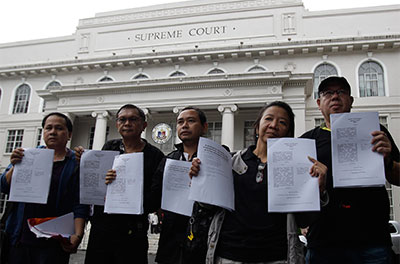In a notoriously litigious country like the Philippines, it’s bewildering that the government coupled a law targeting so-called cybercrimes like cybersex, child pornography, identity theft, and spamming with the hoary and over-used concept of libel. And no matter how abusive those crimes may be, it’s an even bigger mystery why the government felt it should suspend its lengthy heritage of due legal process by giving the Department of Justice power to shut down websites and monitor all online activities without a warrant.
That’s what happened when President Benigno Aquino III signed the Cybercrime Prevention Act of 2012 into law on September 12. It went into effect on October 3.
By October 4, the government admitted it had made a mistake when presidential spokesman Edwin Lacierda said in a statement, “Questions have been raised about the constitutionality of certain provisions of the act. We recognize and respect efforts not only to raise these issues in court, but to propose amendments to the law in accordance with constitutional processes.”
“Raise these issues in court,” indeed. By the BBC’s count, at least eight petitions to the Supreme Court from various groups called into question the law’s constitutionality. Hacktivists assaulted government websites, protesting journalists took to the streets, and some Facebook users (including the widely circulated Inquirer) replaced their profile picture with a blank screen. When senators started to criticize the bill that had passed through their chambers, Malacañang (the presidential palace) applauded the criticisms, saying, in so many words, “Let the amending begin.” Few of those protesting are making arguments to repeal the restrictions that are aimed at protecting underage women or punishing fraudsters for stealing personal information.
The no due process/no warrant clause might be the first to go. But, for journalists and other citizens, the libel laws are equally threatening. Under the new law, comments posted online and judged libelous are criminal offenses, with a penalty of up to 12 years in jail–a much longer sentence than for libel in traditional media.
This is chilling, to say the least. Politicians accusing critics of libel is a time-honored sport in the Philippines, though very often one which does not bring a conviction. Well-heeled, well-lawyered politicos love to harass their critics, cowing them into silence through the threat of lengthy, draining lawsuits making their way languidly through the Philippine court system. You can read CPJ’s detailed account here but, for example, in 2006 the government of President Gloria Macapagal Arroyo “filed at least 10 different criminal libel lawsuits against 43 different journalists seeking damages totaling 70 million pesos (US$1.4 million). Penalties for criminal libel convictions in the Philippines also include imprisonment of six months to six years,” we reported. Libel-wise, that was an extraordinarily bad year, but also an indicator of how public figures, corrupt or not, go about protecting their image.
(It’s worth noting that former President Arroyo spent the past eight months under hospital arrest on charges of election fraud, before being freed in July because of insufficient evidence. She faces additional allegations of taking gifts in relation to a telecommunications deal in 2007, according to local media reports. On Thursday she was charged with “plunder” and remains in custody.)
The staff at the presidential palace says it doesn’t know how those suspensions of due process and overzealous libel clauses made it into the law that Aquino signed last month. The palace has tried its best to distance itself since, even though Aquino publicly signed it into law. The term “not irrepealable” is now in play: As presidential spokesman Lacierda said in his Thursday statement, “This law is not perfect. There’s no irrepealable law or there’s no law that cannot be amended.”
Better get to work before some thin-skinned politico decides to silence a tweeting critic with the threat of a 12-year jail sentence.
